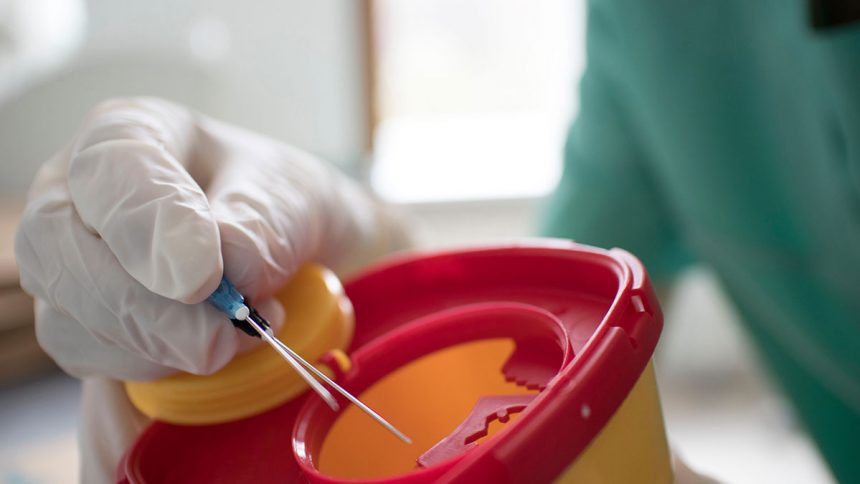
Editor’s Note: The Product Stewardship Institute has successfully assisted Oklahoma in resolving its medical sharps disposal challenge. They have graciously shared their experiences and recommendations for handling medical sharps safely in communities.
Medical sharps, including needles and syringes, are essential tools used by millions to self-administer medications outside of healthcare settings, particularly for conditions like diabetes. With over 8 million residents in the US using self-injecting medications, up to 3 billion needles are used annually.
While medical sharps are crucial for many Americans, improper disposal, such as flushing or throwing them in the trash, can pose serious health and safety risks to residents, sanitation workers, waste management personnel, and others.
Finding proper disposal methods for medical sharps can be challenging. In most states, household sharps are typically advised to be placed in plastic containers and thrown away with household trash. However, this method can still present risks, especially for waste management workers who may come in contact with loose sharps.
According to Patrick Riley from the Oklahoma Department of Environmental Quality (DEQ), the state’s guidelines on household sharps disposal are vague, directing people to use plastic containers, label them, and dispose of them in household trash. But beyond that, there are limited options for sharps disposal in Oklahoma.
The Oklahoma Meds and Sharps Disposal Committee (OMSDC)
Driven by concerns from waste management companies regarding needle-stick injuries, the Oklahoma DEQ sought non-regulatory solutions for safe handling of medical sharps. To tackle this issue, the Product Stewardship Institute (PSI), a leader in proper sharps management since 2008, was chosen to lead the Oklahoma Meds and Sharps Disposal Coalition (OMSDC) with support from the DEQ.
The creation of the OMSDC was not only in response to the lack of adequate disposal options for medical sharps but also to address various challenging waste streams in Oklahoma, such as pharmaceuticals and mercury thermostats. The coalition has been working to expand safe waste disposal options for over a decade.
Recognizing the diverse stakeholders involved, the OMSDC includes waste haulers, medical professionals, and harm reduction organizations. These organizations provide hands-on support like identifying collection locations and promoting programs at related events across the state.
In 2016, PSI and DEQ initiated a drug take-back pilot in Oklahoma, involving various partners like the Oklahoma State Department of Health, Covanta Tulsa, and Tulsa Master Recyclers. This pilot marked the beginning of efforts to create safer disposal options in the state.
In 2021, Oklahoma amended its laws to allow sharps collection, leading to the first sharps collection pilot program. This six-month initiative, which collected medical sharps from residents at no cost, was developed and implemented by PSI and the OMSDC with grant support from DEQ.
In 2022, the OMSDC and PSI partnered with organizations like the Choctaw Nation, Indian Health Services, and Covanta Environmental Solutions to further expand sharps take-back infrastructure in the state. Through this program, 15 health clinics provided residents with containers to drop off or mail in their used sharps for safe disposal.
Along with increasing drop-off locations, the OMSDC organizes collection events for various materials like motor oil, antifreeze, electronics, sharps, and pharmaceuticals. These events offer residents a convenient way to dispose of items that are challenging to get rid of through regular waste disposal methods.
Through initiatives like take-back programs and pilot projects, awareness has been raised about effective waste management strategies in Oklahoma. As a result of these efforts, PSI developed a comprehensive guide to establishing community medical sharps programs in Oklahoma.
Today, there are 49 sharps disposal sites in Oklahoma in addition to regular take-back events. This progress highlights the significance of collaborative efforts and community engagement in enhancing waste management services.
Extended Producer Responsibility for Medical Sharps
Extended producer responsibility (EPR) for medical sharps is a mandatory product stewardship approach that ensures safe and effective management of used needles. While California is currently the only state with an EPR law for medical sharps in the US, France’s DASTRI organization manages 83% of sharps waste through producer-funded programs.
In the US, PSI has been advocating for sharps EPR since 2008, working towards a national solution. This effort has laid the groundwork for California’s medical sharps EPR program and similar programs in nine local jurisdictions.
While voluntary initiatives are effective in managing medical sharps waste, EPR offers a mandatory solution for ensuring safe disposal practices.
What You Can Do
Start by exploring disposal options available in your area and state. Here are steps you can take:
- Contact your local government or solid waste management team to inquire about existing disposal programs.
- Use online resources to find drop-off locations or events for sharps disposal.
- Consider starting a sharps collection program in your community.
- Learn more about EPR for medical sharps.
Addressing medical sharps disposal is a collective effort that requires community engagement. By building partnerships and advocating for safer disposal methods, individuals can contribute to improving waste management practices, safeguarding public health, and protecting the environment.
If you’re interested in starting a coalition or have questions about this work, you can contact PSI at: info@productstewardship.us. Together, we can create safer and healthier communities by ensuring accessible and secure options for medical sharps and medication disposal.
Looking for medical sharps disposal options near you? Enter your ZIP Code in the Earth911 search to find local resources.






